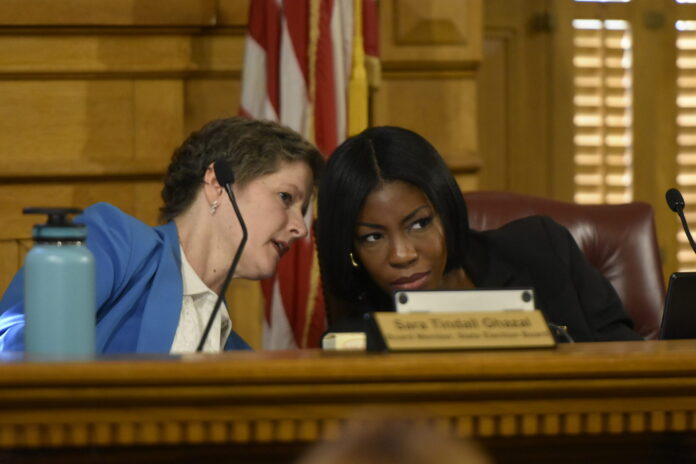
(Georgia Recorder) — The ongoing fight over the recent attempted makeover of how counties run elections by the Georgia State Election Board could be left up to the state’s highest court to decide whether the panel overstepped its authority.
The Georgia Republican Party and the National Republican Committee are requesting the Georgia Supreme Court to make a final call on whether a slew of new requirements will be enforced by the state with just over two weeks until Election Day. The GOP’s lawyers aim to overturn a Fulton County judge’s ruling Wednesday that blocks the State Election Board from enacting several new rules for the Nov. 5 general election unless the state Supreme Court rules otherwise.
Several Republican groups filed a notice of appeal Thursday directly with the Georgia Supreme Court, which will decide whether or not to take up the case. The once obscure election board is now drawing attention across the nation with its rules potentially swinging the presidential election contest between Democratic Vice President Kamala Harris and Republican Donald Trump.
Republicans are seeking a ruling from the Georgia Supreme Court instead of the state Court of Appeals to expedite getting an answer whether the election board’s series of new rules in recent months exceeded the constitutional authority of state election panels.
The Supreme Court will likely decide in the next few days whether to take up a case that concerns a government agencies’ constitutional right to make changes to how elections are conducted statewide.
Georgia public officials, election rights groups, county election officials, and Democratic and Republican party groups are watching with intense interest how Georgia courts resolve recent challenges to State Election Board rules.
Several civil rights organizations are closely monitoring the Republican parties’ filing an appeal Friday requesting the state Supreme Court to reinstate a controversial ballot hand counting rule.
Georgia is one of seven swing states that could sway the outcome of the Nov. 5 presidential match between Harris and Trump.

High-ranking Republican Party officials are blistering in their criticism of Superior Court Judge Thomas A. Cox Jr.’s ruling last week that three right-wing State Election Board members broke the law by assuming rulemaking powers the judge says are the province of the Georgia General Assembly.
Cox wrote in his ruling that the Georgia Constitution only gives the General Assembly the exclusive right to enact laws regarding elections, which the Secretary of State’s Office oversees and certifies.
Cox’s ruling tossed out polarizing rule changes that granted local election board members a right to inspect voting records before certifying results. The judge also tossed out new guidelines giving county election board officials the discretion to consider any vote discrepancies or other election irregularities when deciding whether to reject or certify the results.
The Republican National Committee’s Chairman Michael Whatley called Cox’s ruling the “worst of judicial activism” that was based on political partisanship, rather than on sound legal principles.
“By overturning the Georgia State Election Board’s commonsense rules passed to safeguard Georgia’s elections, the judge sided with the Democrats in their attacks on transparency, accountability, and the integrity of our elections,” Whatley said in a statement.
The State Election Board has been forced to defend against a flurry of lawsuits since former GOP state Sen. Rick Jeffares and political media personality Janelle King were appointed earlier this year to the five-member board. The controversial rules were often approved by a 3-2 majority, with Fulton County Republican Janice Johnston joining Sandy Spring’s King and Henry County’s Jeffares in advancing the proposed changes until the rules were finalized several weeks later.
Georgia Republican Attorney General Chris Carr warned the board in writing in late September the actions by the three members praised by Trump that their actions weren’t allowed under Georgia law.
One of the lawsuits Cox decided Wednesday was filed by Eternal Vigilance Action, an election advocacy nonprofit founded in 2021 by Republican former state Rep. Scot Turner. The individual plaintiffs in the lawsuit included Turner and James Hall, a GOP member of the Chatham County election board.
Turner said he decided to file a lawsuit against the Georgia election board because he believes it improperly assumed election rule duties assigned to the state Legislature. Prior to retiring from the Legislature at the end of 2020, Turner sponsored several significant election legislation and served on the House committee that vetted and voted on advancing election legislation out of committee.
Turner said his lawsuit is about the merits of each of the state board’s new rules, but instead is a defense of the longstanding conservative principle of a government branches with a separation of powers.
“I don’t know what the Supreme Court will do at this point, but I can tell you that whatever happens, we’re prepared to continue the fight,” Turner said.

The Holly Springs Republican, who defended his strong conservative voting record in the Legislature, said he also accused the Georgia election board in 2020 of improperly passing several emergency election rules in response to the pandemic.
Turner said he understands how some election board officials feel frustrated when state lawmakers don’t pass legislation based on the board’s recommendations. However, he said the attorneys defending the current Georgia election board’s rules are arguing in court that an executive branch board of unelected bureaucrats have been delegated powers that contradict Georgia law and conservative ideology.
“You cannot have five unelected people taking things into their own hands in the style of a vigilante or an emperor,” he said.
The timing of the election board’s caused constant tension this summer and fall for members of the state association representing Georgia’s local election officials. The board’s new rules requiring a hand count of paper ballots cast on election day, expanding poll watcher access, and election certification have been criticized by Democrats and civil rights groups as a potential source of chaos at the polls and among county poll workers.
Trump praised King, Jeffares and Johnston by name for supporting changes to county election certification boards and other election rules, calling them “pit bulls” for “victory” during a campaign rally in Atlanta this summer.
The day before Cox delivered his ruling, Superior Court Judge Robert McBurney ruled on a complaint filed by Republican Fulton election board member Julie Adams after she refused to certify the March presidential preference primary. McBurney ruled that it is mandatory for local election boards to certify election results and that county election officials can request to examine election records before the deadline.
King refutes accusations of partistan rulemaking
King lamented Cox’s rejection of the seven rules she helped champion, finding them unconstitutional and adding a reprimand for the election board he says trespassed into the business of legislating. She said she supported the new rules not based on loyalty to Trump or the GOP, but instead her desire to protect the integrity and accuracy of Georgia’s elections.
“This was a Republican who brought this case against us, so it’s not a partisan issue,” she said. “It’s just about how people are viewing our role,” King said Thursday on the Atlanta Journal-Constitution’s Politically Georgia podcast.
She recalled Cox overturned a couple of rules that also had the support of the Georgia Association of Voter Registration and Election Officials.
“I’m really more disappointed in the fact that I feel like the pendulum has swung,” King said. “There were a lot of people who were anti what we were doing, and they were so upset and emotional about it. Now I think they have some reprieve, and now the pendulum has swung the other side.”
The Georgia NAACP and Georgia Coalition for the People’s Agenda, intervening on behalf of plaintiffs challenging a ballot hand count rule they argue would delay key certification deadlines. The rule would mandate that after polls close election night, three poll workers at every precinct would unseal ballot boxes and individually count paper ballots to confirm if the hand tally matches the number of machine-counted ballots.
“We were proud to represent our clients and the interests of Georgia voters and local elections officials in preventing an unelected State Election Board from rewriting our election code, injecting chaos into the democratic system in the immediate run-up to the November election,” said Andrea Young, executive director of American Civil Liberties Union of Georgia, which is helping provide legal services to the intervening groups.
“Early voting has begun and over one million Georgians have already cast their ballots,” Young said in a statement. “Judge Cox’s ruling prevented a rule change in the middle of the game. We were pleased that the trial court agreed with us, and look forward to making our case before the state’s highest court next.”







